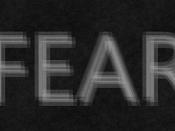The introductory readings, Obrien's If I die in a Combat Zone, Hasford's The Short-Timers, Moore's The Green Berets, and Obrien's Going After Cacciato, all share a common element - fear. An integral part of each story is a sense of fear that helps to intensify the experiences being related by the author; ie make the stories more realistic. Without the use of fear, these stories would lose much of their impact. The entire experience of Vietnam pivots on fear for many of the characters in these stories.
In Obrien's If I die in a Combat Zone, the main character struggles to balance his fear with his duty to his country, his town, and himself. 'So to bring the conversations to a focus and also to try out in real words my secret fears, I argued for running away,' (Combat, 29) the character says. He simply is torn between what he feels is a responsibility, and the many parts of his fear.
Afraid of not upholding his pride, afraid of dying in a, '[war that] was wrongly conceived and poorly justified,' (Combat, 29), and crippled by, 'Doubts...hedged all this: I had neither the expertise nor the wisdom to synthesize answers...' (Combat, 29), the character simply is paralyzed by fear, and because of this, gets on the draftee bus without really having made a decision.
It was an intellectual and physical stand-off, and I did not have the energy to see it to an end. I did not want to be a soldier, not even a observer to war. But neither did I want to upset a peculiar balance between the order I knew, the people I knew, and my own private world. It was not that I valued that order. But I feared its opposite, inevitable...


